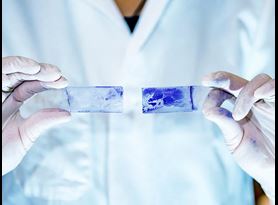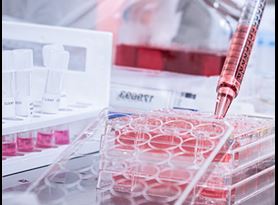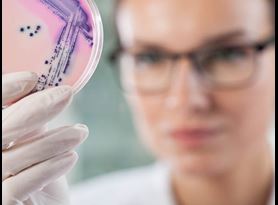European countries and other jurisdictions require biocidal products, which are regulated by the European Chemical Agency (ECHA), be tested using European Standards. Successfully navigate ECHA regulations and ensure compliance to in-depth testing requirements with the support of įń√Ň2023»ęńÍ’żįś√‚∑—◊ ŃŌ’s consultative regulatory and scientific experts.
Detailed testing requirements for biocidal products regulated by the ECHA are specified within the (BPR). Typically, testing of biocidal products is performed in a two-step manner, using both a suspension based method and a carrier based method. With more than fifteen years of experience supporting the successful registration of biocidal products in the European market, in addition to our extensive experience, expertise, and regulatory knowledge, įń√Ň2023»ęńÍ’żįś√‚∑—◊ ŃŌ is the partner of choice for leading biocidal product developers, manufacturers, and marketers. Explore a partnership with įń√Ň2023»ęńÍ’żįś√‚∑—◊ ŃŌ’s antimicrobial experts today.
After browsing our methods, if you find that we are missing the one you're interested in, please reach out to us to explore alternative methods and custom protocols.
Suspension based testing
EN 1040 - Basic Bactericidal Activity of Chemical Disinfectants - The European standard, , specifies a test method and minimum requirements for basic bactericidal activity of a chemical disinfectant or antiseptic product. The test systems to be used in this study will follow the CEN (European Committee for Standardization) approved method as specified in EN 1040.
A bacterial suspension is added to the test substance. At the Sponsor specified exposure time, an aliquot is taken; the bactericidal and/or bacteriostatic activity in this portion is immediately suppressed by dilution neutralization or filtration neutralization. The number of surviving bacteria in each sample is determined and the reduction in viable counts is calculated. Appropriate initial suspension, culture purity, sterility and neutralization validation controls are performed.
EN 1275 - Quantitative Suspension Test for the Evaluation of Basic Fungicidal or Basic Yeasticidal Activity of Chemical Disinfectants - The European standard, , specifies a test method and minimum requirements for basic fungicidal or basic yeasticidal activity of a chemical disinfectant or antiseptic product. The test systems to be used in this study will follow the CEN (European Committee for Standardization) approved method as specified in EN 1275. The most contemporary method published by the CEN for the preparation/processing of Aspergillus, as referenced in EN 1650, is used in this protocol.
A fungal suspension is added to a prepared sample of the test substance. At the Sponsor specified exposure time, an aliquot is removed and the fungicidal and/or fungistatic activity in this portion is immediately suppressed by dilution neutralization or filtration neutralization. The number of surviving fungi in each sample is determined and the reduction in viable counts is calculated. Appropriate culture purity, sterility, neutralization validation and initial suspension are performed.
EN 1276 - Quantitative Suspension Test for the Evaluation of Bactericidal Activity of Chemical Disinfectants - This method applies to products used in food, industrial, domestic, and institutional areas excluding situations where disinfection is medically indicating and excluding products used on living tissues except those for hand hygiene. The test systems to be used in this study will follow the CEN (European Committee for Standardization) approved method as specified in .
A bacterial suspension is added to the test substance and interfering substance. At the Sponsor specified exposure time, an aliquot is taken, and the antimicrobial action is immediately suppressed by dilution neutralization or filtration neutralization. The number of surviving bacteria in each sample is determined and the reduction in viable counts is calculated. Appropriate culture purity, sterility, initial suspension, and neutralization validation controls are performed.
EN 1650 - Quantitative Suspension Test for the Evaluation of Fungicidal Activity of Chemical Disinfectants - The European standard, , describes a suspension test method for establishing the fungicidal or yeasticidal activity of chemical disinfectants or antiseptic products. The test systems to be used in this study will follow the CEN (European Committee for Standardization) approved method.
A test suspension of fungi is added to a prepared sample of the test substance and interfering substance. At the Sponsor specified exposure time, an aliquot is removed and the fungicidal and/or fungistatic activity is immediately suppressed by dilution neutralization or filtration neutralization. The number of surviving fungi in each sample is determined and the reduction in viable counts is calculated. Appropriate culture purity, sterility, initial suspension, neutralization validation controls are performed.
EN 13727 - Chemical Disinfectants and Antiseptics - Quantitative Suspension Test for the Evaluation of Bactericidal Activity in the Medical Area - The standard specifies a test method and the minimum requirements for bactericidal activity of chemical disinfectant and antiseptic products that are used in instrument disinfection by immersion, and surface disinfection by wiping, spraying, flooding or other means. The test systems to be used in this study will follow CEN (European Committee for Standardization) approved method, EN 13727.
A test suspension of bacteria is added to a prepared sample of the test substance and interfering substance. At the Sponsor specified exposure time, an aliquot is taken; the bactericidal and/or bacteriostatic activity in this portion is immediately suppressed by dilution neutralization or filtration neutralization. The number of surviving bacteria in each sample is determined and the reduction in viable counts is calculated. Appropriate initial suspension, culture purity, sterility, and neutralization validation controls are performed.
EN 13624 - Chemical Disinfectants and Antiseptics - Quantitative Suspension Test for the Evaluation of Fungicidal or Yeasticidal Activity in the Medical Area - The standard specifies a test method and the minimum requirements for fungicidal or yeasticidal activity of chemical disinfectant products intended to disinfect instruments by immersion in the medical area. The test systems to be used in this study will follow CEN (European Committee for Standardization) approved method, EN 13624. The most contemporary method published by the CEN for the preparation/processing of Aspergillus, as referenced in EN 1650, is used in this protocol.
A test suspension of fungi is added to a prepared sample of the test substance and interfering substance. At the Sponsor specified exposure time, an aliquot is removed and the fungicidal and/or fungistatic activity is immediately suppressed by dilution neutralization or filtration neutralization. The number of surviving fungi in each sample is determined and the reduction in viable counts is calculated. Appropriate initial suspension, sterility, culture purity, and neutralization validation controls are performed.
EN 14348 - Chemical Disinfectants and Antiseptics - Quantitative Suspension Test for the Evaluation of Mycobactericidal Activity of Chemical Disinfectants in the Medical Area - Including Instrument Disinfectants - The standard specifies a test method and the minimum requirements for Mycobactericidal (or tuberculocidal) activity of a chemical disinfectant product designed for use in medical areas. The test systems to be used in this study will follow the CEN (European Committee for Standardization) approved method, EN 14348.
A test suspension of Mycobacteria is added to a prepared sample of the test substance and interfering substance. At the Sponsor specified exposure time, an aliquot is taken; the Mycobactericidal activity in this portion is immediately suppressed by neutralization. The number of surviving Mycobacteria in each sample is determined and the reduction in viability is calculated. Appropriate initial suspension, culture purity, sterility and neutralization validation controls are performed.
Hard surface based testing
EN 13697 - European Quantitative Surface Test for the Evaluation of Bactericidal Activity - The purpose of this study is to determine the bactericidal activity of a test substance on a non-porous surface according to the test method by CEN (European Committee for Standardization). The method described is intended to determine the activity of commercial formulations or active substances on bacteria under the conditions in which they are intended to be used.
This study will follow the EN 13697 method and includes modifications to the test system drying procedure designed to ensure consistent performance in the laboratory. In addition, a ±1 hour incubation window has been allowed for after test incubation to provide reasonable laboratory flexibility during incubation. A film of bacterial cells dried on the surface of a specified carrier is exposed to the test substance for a specified exposure time. After exposure, the carriers are transferred to vessels containing neutralizing subculture media and assayed for survivors. Appropriate initial suspension, water, sterility, culture purity, and neutralization validation controls are performed.
The įń√Ň2023»ęńÍ’żįś√‚∑—◊ ŃŌ advantage
įń√Ň2023»ęńÍ’żįś√‚∑—◊ ŃŌ has been the trusted partner for leading developers, manufacturers, and marketers of biocidal products for more than three decades. A leader in antimicrobial testing, our consultative scientific and regulatory experts stay up to date on market trends and regulatory guidance, including the in-depth testing requirements detailed within the BPR. Confidently and successfully navigate ECHA regulatory requirements and product registration with the support of įń√Ň2023»ęńÍ’żįś√‚∑—◊ ŃŌ.
We can test products to methods that are not listed on our website. If you do not see the method you are interested in, connect with us today to explore alternative methods. With decades of experience in microbiology and virology, our team can develop custom protocols to meet your specific needs. For more information about įń√Ň2023»ęńÍ’żįś√‚∑—◊ ŃŌ’s antimicrobial EN testing and microbiology testing for BPR, contact us today.
Learn more

Microbiology Testing
įń√Ň2023»ęńÍ’żįś√‚∑—◊ ŃŌ offers a diverse array of microbiology testing services and can serve clients from early-stage antimicrobial product development and non-GLP screen testing all the way through GLP testing for submission.

Virology Testing
įń√Ň2023»ęńÍ’żįś√‚∑—◊ ŃŌ offers GLP and cGMP virology testing options to serve our clients in the antimicrobial and pharmaceutical industries.

About įń√Ň2023»ęńÍ’żįś√‚∑—◊ ŃŌ Eagan
įń√Ň2023»ęńÍ’żįś√‚∑—◊ ŃŌ Eagan is the premier contract antimicrobial testing laboratory and expert partner to the developers, manufacturers and users of antimicrobial pesticide and biocide products. We have more than 30 years of experience generating GLP-compliant data.

Client Portal
Secure 24/7 access to your test result information, which you can download directly to your information management system.

